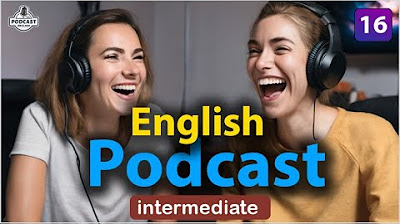Powerful Podcasts for English Fluency | Episode 10
Summary
TLDRIn this episode of English Pod, hosts Marco and Erica explore the process of applying for a visa, focusing on the crucial visa interview. They discuss various types of visas, including B2 for tourists and F1 for students. The dialogue illustrates a visa interview scenario, highlighting vocabulary such as 'sponsoring,' 'invitation letter,' 'ties,' 'financially independent,' and 'assets.' The hosts also provide tips for answering common visa interview questions, emphasizing the importance of demonstrating strong ties to one's home country to ensure a successful application.
Takeaways
- 😀 The podcast episode focuses on the process of applying for a visa, specifically a US visa, and the importance of the visa interview.
- 📄 A visa is an official document that allows legal travel to a country, differing from a credit card despite sharing the name.
- 🏆 The B2 visa is highlighted as a tourist visa for the US, with other types like the F1 for students and the J1 for exchange visitors being mentioned.
- 🗣️ The dialogue in the podcast includes a mock visa interview, demonstrating how applicants might be questioned and how to respond.
- 🏡 'Ties' to one's home country are crucial for visa interviews, representing commitments like property, family, or employment that ensure the applicant's return.
- 💼 The term 'sponsoring' is defined as taking financial responsibility for a visa applicant, ensuring they have sufficient funds for their stay.
- 💼 An 'invitation letter' is a formal document used in visa applications, showing an invitation from a host in the destination country.
- 💵 'Financially independent' means having enough personal funds to cover one's expenses without relying on others.
- 🏦 'Assets' refer to valuable possessions owned by an individual, such as real estate, vehicles, or investments, which can support a visa application.
- 🎓 The podcast concludes with practical advice for listeners, suggesting they prepare thoroughly for their own visa interviews with the right documents and responses.
Q & A
What is the main topic of the English Pod lesson in the transcript?
-The main topic of the English Pod lesson is about applying for a visa, specifically focusing on the visa interview process.
What type of visa is discussed in the lesson?
-The lesson discusses a B2 Visa, which is a tourist visa for the United States.
What is the difference between a B2 Visa and a resident Visa as mentioned in the transcript?
-A B2 Visa is a tourist visa for temporary visits, while a resident Visa allows the holder to live in the country legally for a determined period, such as an F1 for students or a J1 for exchange visitors.
Why is the vocabulary 'sponsoring' important in the context of a visa application?
-The vocabulary 'sponsoring' is important because it refers to someone who takes responsibility for a person applying for a visa, ensuring they have enough money and covering their expenses.
What is an 'invitation letter' in the context of visa applications?
-An 'invitation letter' is a formal letter from a friend, relative, or business inviting someone to visit their country for a specific purpose, which is required for the visa application process.
What does the term 'ties' refer to when discussing a visa application?
-The term 'ties' refers to the responsibilities or connections that link a person to their home country, such as a job, family, property, or financial assets, which demonstrate their intention to return home.
Why is demonstrating 'financial independence' crucial during a visa interview?
-Demonstrating 'financial independence' is crucial because it shows that the applicant has enough money to support themselves without needing to work illegally in the host country, reducing the risk of them becoming an illegal immigrant.
What is meant by 'assets' in the context of the visa application dialogue?
-In the context of a visa application, 'assets' refer to valuable possessions owned by the applicant in their home country, such as a house, car, or investments, which serve as evidence of their financial stability.
How does the dialogue in the transcript illustrate the importance of being specific in visa interview answers?
-The dialogue illustrates the importance of being specific by showing how the applicant provides detailed information about their travel plans, duration of stay, and ties to their home country, which helps convince the interviewer of their intention to return.
What is the humorous twist at the end of the dialogue and what does it imply about visa application realities?
-The humorous twist at the end of the dialogue is the applicant being granted a resident visa instead of the tourist visa they applied for. This implies that such a situation is unlikely to happen in real life and is used for comedic effect, highlighting the strictness of visa application processes.
Outlines

このセクションは有料ユーザー限定です。 アクセスするには、アップグレードをお願いします。
今すぐアップグレードMindmap

このセクションは有料ユーザー限定です。 アクセスするには、アップグレードをお願いします。
今すぐアップグレードKeywords

このセクションは有料ユーザー限定です。 アクセスするには、アップグレードをお願いします。
今すぐアップグレードHighlights

このセクションは有料ユーザー限定です。 アクセスするには、アップグレードをお願いします。
今すぐアップグレードTranscripts

このセクションは有料ユーザー限定です。 アクセスするには、アップグレードをお願いします。
今すぐアップグレード関連動画をさらに表示

EnglishPod 62 - Advanced - Job Interview 2

Powerful Podcasts for English Fluency | Episode 16

English Boost Level Up Your Skills | English Podcast Conversation | Episode 02

English Learning Podcast Conversation Episode 17 | Intermediate | English Speaking Practice Podcast

English Learning Podcast Conversation | English Podcast For Advanced | Episode 01

Powerful Podcasts for English Fluency | Episode 09
5.0 / 5 (0 votes)
